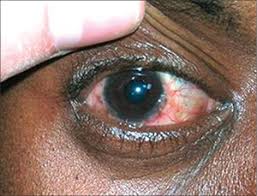
Allergic Conjunctivitis: causes, symptoms, treatment, prevention
Conjunctivitis simply mean an inflammation (swelling of the eye). This can be due by bacterial, viral or even allergic interactions. Allergic Conjunctivitis is the swelling of the eye due to allergies.
Today, we are going to talk about Allergic Conjunctivitis.
Table of Content
What is Allergic Conjunctivitis
Allergic conjunctivitis is an inflammation of the conjunctiva of the eye caused by an allergic reaction to substances like pollen or mild spores.
The conjunctiva is the thin transparent membrane that covers the inside of the eye lid and the white part of the eye known as the SCLERA. When this covering of the white part of the eye swells up (inflame), we say that a person has conjunctivitis.
Pollen: are small dust like substances that is usually produced by plants in our environments.
See also: Cataracts
Types of allergic conjunctivitis
There are different types of Allergic conjunctivitis. It can be Seasonal, Perennial, Vernal keratoconjunctivitis or Atopic.
Seasonal allergic conjunctivitis: is caused by airborne pollen of trees, grasses or weeds. Those with seasonal allergic conjunctivitis typically have symptoms for a defined period of time, that is spring or late summer corresponding to the life cycle of pollen which is the causative agent. They are however symptom-free during winter because of decreased airborne transmission of those allergens.
Perennial allergic conjunctivitis: is caused by dust mites, animal dander and other non-seasonal allergens. Individuals who have this type of allergic conjunctivitis have symptoms all year round.
Vernal keratoconjunctivitis: is a type of conjunctivitis commonly associated with other allergic conditions like asthma and other seasonal allergies. It is typically seasonal appearing each spring and subsides during winter. Many children outgrow the condition by early adulthood.
Atopic keratoconjunctivitis: runs a chronic course and often affects patients with atopic dermatitis (allergic inflammation of skin). Patients with this condition have strong genetic predisposition to have increased immune responses to common allergens.
Symptoms of Allergic Conjunctivitis
The symptoms are present all year round. They include:
- redness of eye: persons with this condition, due to the inflammation (swelling) leading to more blood flow to the eyes, would have an eye that would be red in colour.
- discharge: there would be increased discharge of fluid (like tears) from the eyes.
- itching: there would be a an itchy sensation in the eyes, and you would be always tempted to rub your eyes.
- photophobia: you would have a dislike for bright lights, due to pain and would try to avoid them.
- foreign body sensation: you would feel like there is something in your eyes, and this would add to the urge to always rub it.

Treatment for Allergic Conjunctivitis
If you suspect you have this condition, please see your doctor for expert management. Drugs like antihistamines, NSAIDS and corticosteroids can be used for treatment but mild cases are usually left alone.
Prevention of Allergic Conjunctivitis
The following measures can help in preventing of decreasing chances of developing Allergic conjunctivitis. They include;
- Avoid contact with those allergens that cause inflammation. Either remove the source of those substances that you are allergic to, or you change your environment if the substances cannot be removed from the place.
- Keep your doors and windows close especially during the rainy seasons or harmattan.
- If you are allergic to animals or animal related substances, you can consider not having pets.
- Wash all your bedding and clothing worn at least once a week
- Clean surfaces regularly with a clean damp cloth to remove the dust particles that settle on them which might cause this allergies.
- Use sunglasses when outside. Helps in reducing risk of conjunctivitis as well as cataracts.



Leave a reply